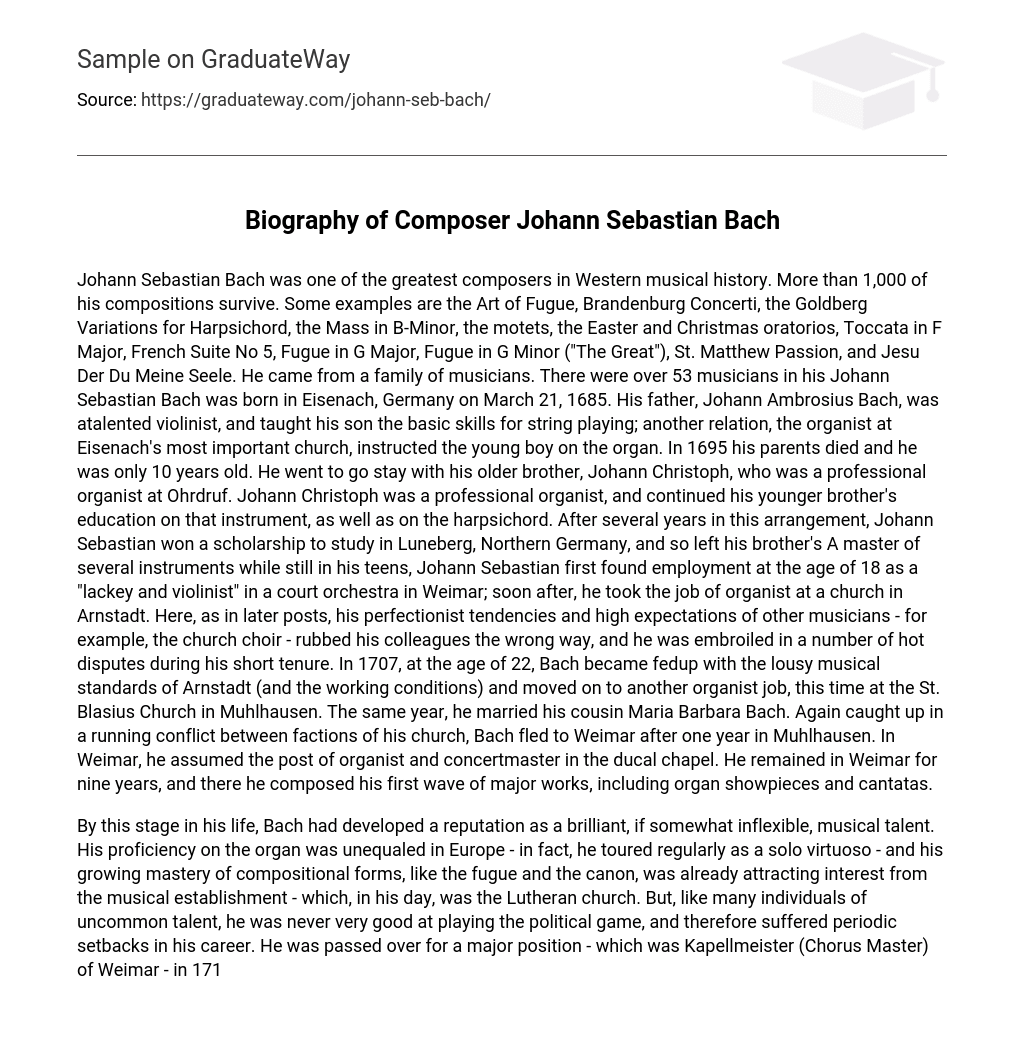Johann Sebastian Bach, a member of a family of musicians, is widely regarded as one of the greatest composers in Western musical history. He left behind over 1,000 compositions, including the Art of Fugue, Brandenburg Concerti, Goldberg Variations for Harpsichord, Mass in B-Minor, motets, Easter and Christmas oratorios, Toccata in F Major, French Suite No 5, Fugue in G Major, Fugue in G Minor “The Great,” St. Matthew Passion, and Jesu Der Du Meine Seele.
Johann Sebastian Bach, born in Eisenach, Germany on March 21, 1685, came from a family of talented musicians. His father, Johann Ambrosius Bach, was a skilled violinist and taught him the fundamentals of string playing. Additionally, another family member who was an organist at Eisenach’s main church provided him with instruction on the organ. Tragedy struck in 1695 when both of his parents passed away and he was just 10 years old.
Johann Sebastian went to live with his older brother Johann Christoph, who was a professional organist at Ohrdruf. Johann Christoph taught his younger brother about the organ and the harpsichord. After a few years, Johann Sebastian received a scholarship to study in Luneberg, Northern Germany and left his brother’s place. A talented musician, Johann Sebastian started working at the age of 18 as a “lackey and violinist” in a court orchestra in Weimar. Shortly after, he became an organist at a church in Arnstadt.
During his early career, Johann Sebastian Bach’s perfectionism and high expectations of other musicians caused friction among his colleagues, including the church choir in Arnstadt. This led to several heated disputes during his short time there. At the age of 22 in 1707, Bach grew tired of the subpar musical standards and working conditions in Arnstadt. As a result, he decided to move on and became an organist at St. Blasius Church in Muhlhausen. In that same year, Bach married his cousin Maria Barbara Bach. However, conflicts within his new church arose once again, prompting him to flee to Weimar after just one year in Muhlhausen.
In Weimar, Bach took on the roles of organist and concertmaster in the ducal chapel. He remained in Weimar for nine years and utilized this time to compose numerous major works, which included notable organ pieces and cantatas.
By this point in his life, Bach had gained a reputation as a brilliant musician, although some considered him inflexible. His organ skills were unrivaled in Europe, and he frequently embarked on solo tours to showcase his virtuosity. The musical establishment, particularly the Lutheran church, was beginning to recognize his expertise in composition, especially in forms like the fugue and canon. However, Bach’s lack of political prowess hindered his career progress. In 1716, he was denied the prestigious position of Kapellmeister in Weimar which prompted him to depart for Anhalt-Cothen the following year where he became a court conductor. During this period, he shifted his focus from church cantatas to instrumental music resulting in remarkable compositions such as the Brandenburg Concerti.
Bach’s first wife, Maria Barbara, died while he was at Cothen. He quickly remarried Anna Magdalena and continued his work. He also had 13 children with his new wife, six of whom survived childhood, in addition to the four children he had with Maria Barbara. Some of his children, especially Wilhelm Friedmann, Carl Philipp, and three others, became successful composers in their own right. After working as conductor and composer for the court orchestra in Cothen for seven years, Bach was offered the prestigious position of cantor at St. Thomas’ Church in Leipzig. This position had been previously rejected by two other composers. The job was demanding; Bach had to compose music for the churches, conduct choirs, oversee musical activities at other churches, and teach Latin at the St. Thomas choir school. Despite difficulties with church authorities, Bach persisted and improved the musical quality of church services in Leipzig. He continued to create music of exceptional craftsmanship and emotional depth.
Bach stayed in Leipzig until he died in 1750, and he continued to be creative until the end, despite being practically blinded by cataract problems in 1740. He dictated his final musical composition, a chorale prelude called “Before They Throne, My God, I Stand,” to his son-in-law shortly before his death.





